
Faust is the protagonist of a classic German legend based on the historical Johann Georg Faust.
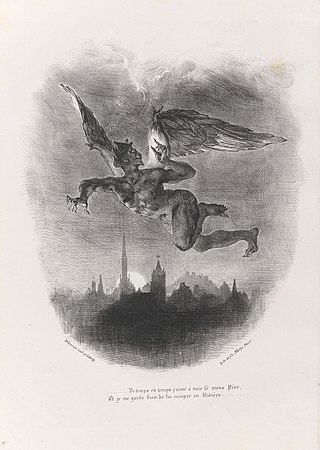
Mephistopheles, also known as Mephisto, is a demon featured in German folklore. He originally appeared in literature as the demon in the Faust legend and has since become a stock character appearing in other works of arts and popular culture.

La damnation de Faust, Op. 24 is a work for four solo voices, full seven-part chorus, large children's chorus and orchestra by the French composer Hector Berlioz. He called it a "légende dramatique". It was first performed at the Opéra-Comique in Paris on 6 December 1846.

The Tragical History of the Life and Death of Doctor Faustus, commonly referred to simply as Doctor Faustus, is an Elizabethan tragedy by Christopher Marlowe, based on German stories about the title character Faust. It was probably written in 1592 or 1593, shortly before Marlowe's death. Two different versions of the play were published in the Jacobean era several years later.
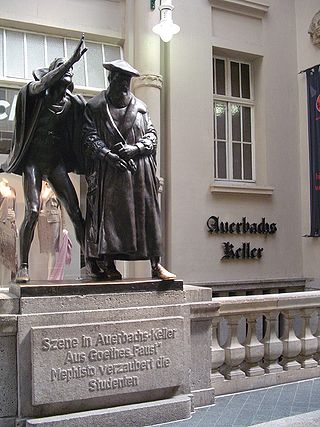
Faust is a tragic play in two parts by Johann Wolfgang von Goethe, usually known in English as Faust, Part One and Faust, Part Two. Nearly all of Part One and the majority of Part Two are written in rhymed verse. Although rarely staged in its entirety, it is the play with the largest audience numbers on German-language stages. Faust is considered by many to be Goethe's magnum opus and the greatest work of German literature.

Faust is an opera in five acts by Charles Gounod to a French libretto by Jules Barbier and Michel Carré from Carré's play Faust et Marguerite, in turn loosely based on Johann Wolfgang von Goethe's Faust, Part One. It debuted at the Théâtre Lyrique on the Boulevard du Temple in Paris on 19 March 1859, with influential sets designed by Charles-Antoine Cambon and Joseph Thierry, Jean Émile Daran, Édouard Desplechin, and Philippe Chaperon.

Woland is a fictional character in the novel The Master and Margarita by the Russian (Soviet) author Mikhail Bulgakov, written between 1928 and 1940. Woland is the mysterious foreigner and professor whose visit to Moscow sets the plot rolling and turns the world upside-down.

Faust: The Second Part of the Tragedy is the second part of the tragic play Faust by Johann Wolfgang von Goethe. It was published in 1832, the year of Goethe's death.
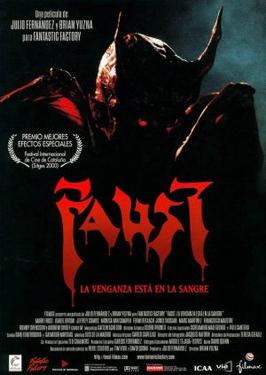
Faust: Love of the Damned is a 2000 Spanish English-language superhero horror film directed by Brian Yuzna. It is adapted from a screenplay by David Quinn and Miguel Tejada-Flores based on the comic book of the same name by Tim Vigil and David Quinn. It was produced by Ted Chalmers, Carlos, Julio and Antonio Fernández, Bea Morillas, Miguel Torrente and Brian Yuzna. It premiered at the Sitges International Fantastic Film Festival on 12 October 2000.

Auerbachs Keller is the second oldest restaurant in Leipzig, Germany. Already one of the city's most important wine bars by the 16th century, it owes its worldwide reputation to Goethe's play Faust as the first place Mephistopheles takes Faust on their travels.

Faust: A Tragedy is the first part of the tragic play Faust by Johann Wolfgang von Goethe, and is considered by many as the greatest work of German literature. It was first published in 1808.
Historia von D. Johann Fausten is an opera by the Russian composer Alfred Schnittke (1934–1998) in three acts, with introduction and epilogue to the German libretto by Jörg Morgener and Alfred Schnittke after the anonymous prose book of the same name.

Doktor Faust is an opera by Ferruccio Busoni with a German libretto by the composer, based on the myth of Faust. Busoni worked on the opera, which he intended as his masterpiece, between 1916 and 1924, but it was still incomplete at the time of his death. His pupil Philipp Jarnach finished it. More recently, in 1982, Antony Beaumont completed the opera using sketches by Busoni that were previously thought to have been lost. Nancy Chamness published an analysis of the libretto to Doktor Faust and a comparison with Goethe's version.

Faust up to Date is a musical burlesque with a libretto was written by G. R. Sims and Henry Pettitt, and a score written by Meyer Lutz. Set in Nuremberg, it is a spoof of Gounod's opera, Faust, which had first been performed in London in 1864. The burlesque followed on from an earlier Lutz musical, Mephistopheles, or Faust and Marguerite.

Scenes from Goethe's Faust is a musical-theatrical work by composer Robert Schumann. The work has been described as the height of his accomplishments in the realm of dramatic music. The work was written between 1844 and 1853 and is scored for SATB chorus, boys' chorus, orchestra, and a number of solo parts which, even with doubling, require seven solo singers, although eight is the usual number for a performance. Schumann never saw all three parts of the work performed in the same concert, or published together. Eric Sams comments 'There is no coherence in the orchestration, which audibly dates from two different periods ', leading him to conclude that Schumann did not conceive the work as a whole, although late nineteenth-century ideas of performance mean that in the modern era the piece is predominantly heard with all three parts.
This article lists cultural references to Mephistopheles, the fictional devil from Faust and Doctor Faustus who has been used in other pieces of literature, film, comics and music.
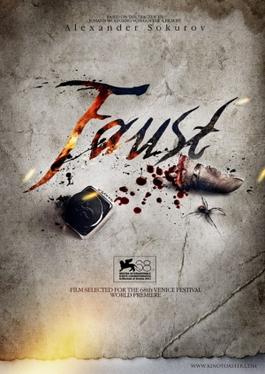
Faust is a 2011 Russian film directed by Alexander Sokurov. Set in the 19th century, it is a free interpretation of the Faust legend and its respective literary adaptations by both Johann Wolfgang von Goethe (1808) as well as Thomas Mann. The dialogue is in German. The film won the Golden Lion at the 68th Venice International Film Festival. At the 2012 Russian Guild of Film Critics Awards the film was awarded the prizes for Best Film, Best Director, Best Script and Best Male Supporting Actor. It received generally positive reviews from critics.
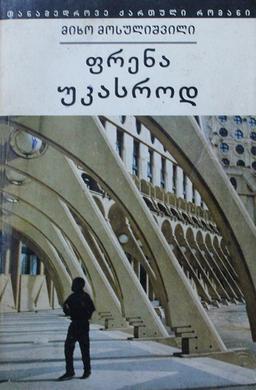
Flight without a tun is a 2001 Georgian novel by author Miho Mosulishvili.
Temptation is a Faustian play written by Czech playwright Václav Havel in 1985 that premiered in Austria on 22 May 1986 in the Burgtheater in Vienna. The play premiered in Czechoslovakia on 27 October 1990, at the J. K. Tyl Theatre in Plzeň. It premiered in the United Kingdom on 30 April 1987 at The Other Place Theatre, Stratford upon Avon. It premiered in the United States on 9 April 1989, at The Public Theater in New York City. In 1989, Temptation was translated to English by the Czech author and journalist Marie Winn.
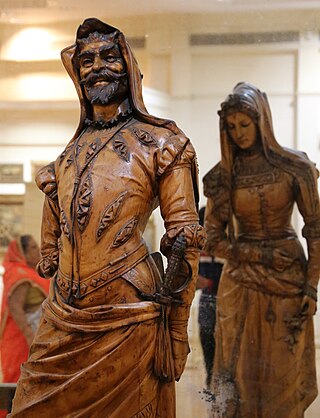
Mephistopheles and Margaretta is a 19th-century wooden "double sculpture" of two characters from Johann Wolfgang von Goethe's 1808 play Faust. The obverse depicts the demon Mephistopheles, and the reverse depicts a woman, Margaretta. A mirror placed behind the sculpture allows both sides to be seen simultaneously.















